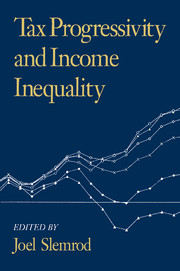Book contents
- Frontmatter
- Contents
- Preface
- List of contributors
- 1 Introduction
- 2 Trends in federal tax progressivity, 1980–93
- COMMENTS
- 3 The lifetime incidence of state and local taxes: measuring changes during the 1980s
- COMMENTS
- 4 Trends in income inequality: the impact of, and implications for, tax policy
- COMMENTS
- 5 The efficiency cost of increased progressivity
- COMMENTS
- 6 On the high-income Laffer curve
- COMMENTS
- 7 Tax progressivity and household portfolios: descriptive evidence from the Survey of Consumer Finances
- COMMENTS
- 8 Progressivity of capital gains taxation with optimal portfolio selection
- COMMENTS
- 9 Perceptions of fairness in the crucible of tax policy
- COMMENTS
- 10 Progressive taxation, equity, and tax design
- Index
COMMENTS
Published online by Cambridge University Press: 20 May 2010
- Frontmatter
- Contents
- Preface
- List of contributors
- 1 Introduction
- 2 Trends in federal tax progressivity, 1980–93
- COMMENTS
- 3 The lifetime incidence of state and local taxes: measuring changes during the 1980s
- COMMENTS
- 4 Trends in income inequality: the impact of, and implications for, tax policy
- COMMENTS
- 5 The efficiency cost of increased progressivity
- COMMENTS
- 6 On the high-income Laffer curve
- COMMENTS
- 7 Tax progressivity and household portfolios: descriptive evidence from the Survey of Consumer Finances
- COMMENTS
- 8 Progressivity of capital gains taxation with optimal portfolio selection
- COMMENTS
- 9 Perceptions of fairness in the crucible of tax policy
- COMMENTS
- 10 Progressive taxation, equity, and tax design
- Index
Summary
In his paper Joel Slemrod quotes F. Scott Fitzgerald and Ernest Hemingway as musing that the rich are those who have more money than themselves. This anecdote is interesting not only for its humor, but because both Fitzgerald and Hemingway would have been classified as relatively rich on a lifetime basis, even if not for every year of their lives under an annual basis. It warns us to be cautious with almost all measures of well-being, income, and wealth.
Although Slemrod's paper is entitled “On the High-Income Laffer Curve,” in truth it turns out to be a broad discussion of various data sets on income and wealth distribution, together with some interpretations of what those data sets do and do not tell us. Some economists disdain research that involves wide-ranging efforts at trying to glean what we know from different empirical observations. I would like to applaud the effort as being refreshingly honest.
The disadvantage as a commentator on this type of research, however, is that there is no one theme on which I can concentrate. Therefore, I must instead join Joel on this journey by heading down a few of the paths he has pointed out and wandering a bit further into the thicket.
One overall observation must be made at the start. It is quite clear that financial or portfolio behavior is much more controllable, especially over the short run, than changes in the provision of real resources: what I invest in, rather than how much; whether I work off the books, as opposed to not working at all.
- Type
- Chapter
- Information
- Tax Progressivity and Income Inequality , pp. 211 - 218Publisher: Cambridge University PressPrint publication year: 1994



